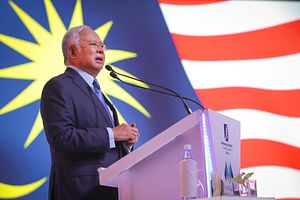Malaysian Prime Minister Najib Razak has called a general election for May 9, with his United Malay National Organization (UMNO) widely expected to win again, thanks to heavy gerrymandering and a whole other set of dirty tricks.
The election date itself has been set for a working Tuesday. Though it has been declared a holiday, critics argue will make it difficult for urban voters as well as the hundreds of thousands of Malaysians who work in Singapore – many of whom favor the opposition – to turn out and cast their ballots.
An important figure in the election will be the popular vote, a number Najib is keen to play down after losing out on that score in 2013 to then opposition leader Anwar Ibrahim, who will remain in jail until June on a sodomy charge his supporters say was trumped up. That figure is often brought up as evidence of the current government’s lack of legitimacy.
Unsurprisingly, this time around, among the electorate, Najib is keen to reinforce the idea that the election is based on the number of seats won and “not based on the popular vote which should be understood by all quarters especially parties that will be contesting in the general election.” Though he is, of course, technically correct, it will no doubt be viewed as yet another attempt to distract from the government’s struggles.
The opposition to UMNO and its Barisan Nasional coalition is Pakatan Harapan, a refashioned, four-party alliance led by 92-year-old Mahathir Mohamad, Malaysia’s longest serving former premier. Though Mahathir’s rule continues to provoke controversy in Malaysia and his leadership of the opposition is a divisive issue, he has nonetheless taken this role as one of Najib’s fiercest critics, including on the corruption allegations that first arose in 2015 surrounding the state-owned investment fund 1MDB.
1MDB is in fact just the latest in a series of scandals that have haunted Najib in politics, with others including the alleged murder of a Mongolian model and the acquisition of Malaysia’s two French submarines.
Importantly, Mahathir intends to seek a royal pardon for Anwar and hand power to him once he’s released, a political strategy that has shored up opposition stocks and provided Najib with his biggest challenge to date.
Whether that is enough to unseat Najib, however, remains to be seen. There are major advantages the ruling party enjoys, including through gerrymandering and other dirty tricks, that could result in Barisan Nasional winning the necessary seats even if it loses its share of the popular vote. Furthermore, Najib has taken care to maintain policies that favor Malaysia and indigenous groups or bumiputeras, which could see him get enough votes among the majority even at the expense of ethnic Chinese and Indian minorities.
This election will be seen for what it is. Najib will probably win, but his legitimacy will be compromised by any further falls in the popular vote. Unless, of course, Mahathir can pull off a stunning victory and pave the way for Anwar into the leadership. That outcome would no change politics in Malaysia more so than any other single event in the country’s history.
Luke Hunt can be followed on Twitter @lukeanthonyhunt































